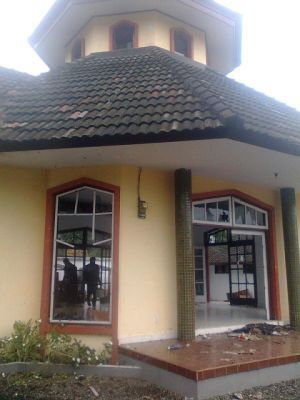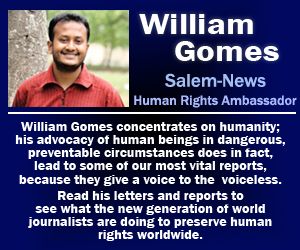
Publisher:
Bonnie King
CONTACT:
Newsroom@Salem-news.com
Advertising:
Adsales@Salem-news.com

~Truth~
~Justice~
~Peace~
TJP
May-11-2012 12:47

 TweetFollow @OregonNews
TweetFollow @OregonNews
INDONESIA: Police Failed to Protect Ahmadiyah Mosque from Attacks
Letter by William Gomes Salem-News.comAttacks towards the Ahmadiyah seem to be encouraged and justified with the issuance of policies that prohibit any religious activities of Ahmadiyah in Indonesia.
 Ahmadiyah Mosque photo courtesy: ahmadiyyatimes.blogspot.com |
(HONG KONG) - An attack was carried out against the Ahmadiyah mosque on 20 April 2012 in Singaparna, Tasikmalaya, West Java. Reports indicate that the perpetrators were the Islamic Defenders Front (Front Pembela Islam, FPI).
 |
Police were on scene at the location of the attack, yet they did not take any adequate measures to prevent the it.
One witnesses said the police and other state officials had been notified about the plan of FPI to come to the mosque a day before the villagers about this. A platoon of police were present while the attack occurred.
Indonesia is a state party to the International Covenant on Civil and Political Rights (ICCPR) and it should take these moral, legal obligations very seriously.
The 1945 Constitution of Indonesia guarantees the right of anyone, without exception, to freedom of religion. The interpretation of these rights should be in accordance with the international human rights standard.
In spite of these national laws, attacks towards the Ahmadiyah seem to be encouraged and justified with the issuance of policies that prohibit any religious activities of Ahmadiyah in Indonesia.
Attacks towards the Ahmadiyah seem to be encouraged and justified with the issuance of policies that prohibit any religious activities of Ahmadiyah in Indonesia.
| “ |
Dear Minister of Religion Affairs, I am William Nicholas Gomes, Human Rights Ambassador for Salem News.com. I am writing to voice my deep concern regarding the attack towards the Ahmadiyah mosque named Baitul Rahim in Singaparna, Tasikmalaya, West Java. I was informed that the attack was allegedly performed by the Islamic Defenders Front (Front Pembela Islam, FPI) on Friday, 20 April 2012. I am disturbed to learn that, before and during the attack, the police was present at the location yet did not take any adequate measures to prevent the attack. According to one of the witnesses, the police and other state officials were aware about the plan of FPI to come to the mosque a day before and they even informed the villagers about this. I was also told that at around 8 in the morning of 20 April 2012, one platoon of police was deployed to the mosque. I was informed that, initially, the FPI’s intention in visiting the mosque was to put a banner which reads that the local residents reject the presence of Ahmadiyah as well as its activities in their area. The leader of the group came to Baitul Rahim mosque also delivered a speech which basically asserted that the mosque should be closed down, in accordance with the 2008 Joint Regulation of the Indonesian Minister of Religious Affair, the Attorney General and the Indonesian Home Minister as well as the West Java Governor’s Regulation concerning the prohibition of Ahmadiyah’s religious activities. Soon after he ordered the group to make sure that the mosque had been sealed, the members of FPI started smashing the windows of the mosque. The leader’s persuasion not to commit any violence was simply ignored and the members of the group kept destroying the lamp, water tab and the TV aerial of the mosque. Three Molotov bombs were also thrown into the mosque which started a fire. The police were present during the attack yet they did not take any measures until the mosque had been severely damaged. I am aware that, under the Law No. 2 Year 2002 concerning the Indonesian National Police as well as the Chief of the Indonesian National Police No. 8 Year 2009, the police in Indonesia are obliged to ensure and protect the safety of every individual within the Indonesia territory and jurisdiction. I have also learned that, in so doing, the police have to respect the non-discrimination principle. I am therefore concerned with the fact that, in this case, the police have failed to protect the security of Ahmadiyah group in Singaparna by not taking adequate measures to prevent and stop the attacks directed by FPI against the Ahmadiyah’s Baitul Rahim mosque. I would also like to emphasise that the 1945 Constitution guarantees the right of anyone, without exception, to freedom of religion. Bearing in mind that Indonesia is a state party to the International Covenant on Civil and Political Rights (ICCPR), the interpretation of such right should be in accordance with the international human rights standard. The term ‘religion’ under such right should be understood in a broad sense. In General Comment No. 22, the UN Human Rights Committee upholds that the term ‘religion’ does not refer only to traditional religions or religions with institutional characteristics or practice analogous to those of traditional religions. The Committee, therefore, ‘views with concern any tendency to discriminate against any religion or belief for any reason, including the fact that they are newly established, or represent religious minorities that may be the subject of hostility on the part of a predominant religious community.’ Based on such interpretation concerning freedom of religion, I believe the 2008 Joint Decree and West Java Governor Regulation No. 12 Year 2011 which prohibit any religious activities of the Ahmadiyah members are in violation of the right to freedom of religion. Under the Law No. 2 Year 2002 regarding the Indonesian National Police, one of the main duties of the police is to provide protection to any members of society. Article 14 paragraph (1) point i of the law specifically establishes that the police is obliged to protect life, properties, the society and the environment from any kind of attacks or disruptions. In exercising such duty, the police have to respect human rights principles, one of which is the prohibition of discrimination. The Chief of the Indonesian National Police’s Regulation No. 8 Year 2009emphasises this by stating in one of its articles that ‘in accordance with the principle of respect for human rights, every INP member in discharging his/her duties or in the course of their daily lives must protect and respect human rights, or at least… act justly and non-discriminatory’. However, this obligation is rarely fulfilled by the police when it comes to cases regarding attacks towards the Ahmadiyah communities in Indonesia. A local NGO, Lembaga Studi dan Advokasi Masyarakat (Institute for Policy Research and Advocacy, ELSAM) reported that Ahmadiyah is the most persecuted religious groups in Indonesia. In 2011, 54% of freedom of religion cases in Indonesia is concerning the Ahmadiyah. The full report in English can be downloaded in here. Despite this fact, those who committed violence against the Ahmadiyah is hardly punished proportionately. Twelve people who beat three Ahmadiyah members to death last year were only sentenced to less than a year imprisonment. In other cases, the perpetrators are just simply got off scot-free. Attacks towards the Ahmadiyah seem to be encouraged and justified with the issuance of policies that prohibit any religious activities of Ahmadiyah in Indonesia. In 2008, the Indonesian Minister of Religious Affair, the Attorney General and the Indonesian Home Minister issued a joint decree banning any religious activities of Ahmadiyah in Indonesia. One of the points established in the joint decree is that the members of Ahmadiyah are prohibited to disseminate any interpretation and religious activities which are not in accordance with the mainstream Islam’s teachings otherwise they will be punished for religious blasphemy, in accordance with laws. Such joint decree influenced the issuance of the Governor of West Java Regulation No. 12 Year 2011 three years later which does not only reaffirm the 2008 Joint Decree but also provides more detailed prohibition of Ahmadiyah’s activities in West Java. For instance, according to Article 3 paragraph (2) of the Governor Regulation, the prohibited activities include the dissemination of Ahmadiyah’s teachings in any forms, the using of any Ahmadiyah’s attributes and the establishment of Ahmadiyah’s name boards. For these reasons, I am urging you to take all the necessary measures to ensure those who are responsible for the attack towards the Baitul Rahim mosque are proportionately punished. The police and other relevant institutions who conduct investigation and examination on this case have to be impartial and do not have any prejudice against the Ahmadiyah which may undermine the settlement of the case. I am also urging you to ensure that all discriminatory laws, policies and practices are repealed and eliminated to stop Indonesia from breaching its human rights obligations and its own constitution. Your swift and effective response on this matter is requested. |
” |
 Salem-News.com Human Rights Ambassador William Nicholas Gomes is a Bangladeshi journalist, human rights activist and author was born on 25 December, 1985 in Dhaka. As an investigative journalist he wrote widely for leading European and Asian media outlets.
Salem-News.com Human Rights Ambassador William Nicholas Gomes is a Bangladeshi journalist, human rights activist and author was born on 25 December, 1985 in Dhaka. As an investigative journalist he wrote widely for leading European and Asian media outlets.
He is also active in advocating for free and independent media and journalists’ rights, and is part of the free media movement, Global Independent Media Center – an activist media network for the creation of radical, accurate, and passionate telling of the truth. He worked for Italian news agency Asianews.it from year 2009 to 2011, on that time he was accredited as a free lance journalist by the press information department of Bangladesh. During this time he has reported a notable numbers of reports for the news agency which were translated into Chinese and Italian and quoted by notable number of new outlets all over the world.He, ideologically, identifies himself deeply attached with anarchism. His political views are often characterized as “leftist” or “left-wing,” and he has described himself as an individualist anarchist.
Articles for May 10, 2012 | Articles for May 11, 2012 | Articles for May 12, 2012

Salem-News.com:

googlec507860f6901db00.html


Terms of Service | Privacy Policy
All comments and messages are approved by people and self promotional links or unacceptable comments are denied.
[Return to Top]
©2025 Salem-News.com. All opinions expressed in this article are those of the author and do not necessarily reflect those of Salem-News.com.